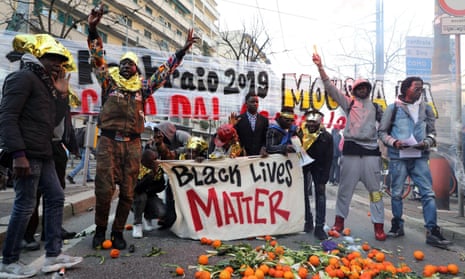Italy’s intelligence agency has warned in a briefing to the country’s parliament that attacks on migrants and minorities could rise in the run-up to May’s European elections.
The number of racially motivated attacks have risen sharply in Italy, tripling between 2017 and 2018, when the far-right League entered government in coalition with the anti-establishment Five Star Movement.
The report from the security intelligence department, which coordinates and submits information collected by the Italian secret services to the prime minister, said racism and xenophobia were among the threats the country could face in 2019. It said there was “a real risk of an increase in episodes of intolerance towards foreigners”.
It warned that assaults by neo-fascist and Nazi groups against migrants “could intensify with the approach of the European elections” and said a probable increase in clashes between anti-fascist and far-right groups could cause serious public order problems.
The intelligence agency report said the Italian far right was characterised in 2018 “by a pronounced vitality” and an increase in xenophobic propaganda “focused on the opposition to migration.”
Separate figures from the anti-racist organisation Lunaria, which publishes quarterly reports on the number of racially motivated attacks in Italy, counted 126 physical attacks, especially against migrants, in 2018. It had recorded 27 racially motivated attacks in 2016 and 46 in 2017.
The latest racist aggression dates back to last Tuesday, when a woman from Ivory Coast was attacked in Bari, in the south of Italy, by men and women who kicked and punched her while shouting racist insults. In Naples two days before, two boys aged 10 and 13 sprayed a 51-year-old man from Benin with pepper spray.
“In Italy, xenophobia is growing exponentially,” the director of the national anti-discrimination office at the ministry of equal opportunities, Luigi Manconi, told the Guardian.
“In the background, there is an economic and social crisis where foreigners are perceived as the cause and, as a consequence, migrants become real scapegoats. It is a worrying phenomenon also because the institutions tend to feed it with knee-jerk reactions and irresponsible gestures.”
Opposition politicians and aid groups have accused the Italian minister of the interior and far-right leader of the League, Matteo Salvini, of creating a climate of hate following the attacks, which have coincided with an anti-migration drive that has included closing Italian ports to NGO rescue boats and a vow to expel migrants.
Salvini has claimed “the wave of racism is simply an invention of the left.” Lunaria’s figures from 2018 recorded 12 shootings, two murders and 33 physical assaults against migrants in the first two months since Salvini entered government.
